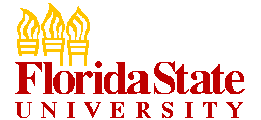
|
|
Planets,
Stars,& Galaxies
AST 1002
|

Honors/Extra Credit Reports:

Honors Papers:
In order to receive Honors credit for the AST1002 course, all students
in the university's Honors program must complete a written research
report
that covers some topic in astronomy. The topic chosen should be
something
of interest to the student doing the report, but also something that
allows them to dig much deeper than what we are able to cover in the
regular class. The Honors credit is available in this course whether
the sudent is registered
in an honors or honors augmented section, or registered in a regular
section
of the class, just so long as that student is a member of the FSU
Honors Program.
This is an opportunity to study in much more detail some astronomical
concept
of interest to you that, because of time constraints or other
considerations,
we did not cover in any depth in class.
The rules for these reports are:
-
 The paper must be typewritten (double-spaced), and between 6-10 pages
in
length, and must conform to standard research report (MLA or
equivalent)
style.
The paper must be typewritten (double-spaced), and between 6-10 pages
in
length, and must conform to standard research report (MLA or
equivalent)
style.
-
 You must present the material you have researched by describing what
you
(and the scientists studying your topic) have learned that is new or
interesting, or present the material as an argument between
competing points of veiw, where
you defend one point of veiw and
show why that idea has won out
over other ideas. The paper cannot be just a regurgitation of long
strings
of facts.
You must present the material you have researched by describing what
you
(and the scientists studying your topic) have learned that is new or
interesting, or present the material as an argument between
competing points of veiw, where
you defend one point of veiw and
show why that idea has won out
over other ideas. The paper cannot be just a regurgitation of long
strings
of facts.
-
 The paper must cite at least 6-10 references to books, articles, or
other sources
of information readily available either at libraries or on the web.
When
citing these references in your bibliography or footnotes, the
citations
must conform to the standard rules of style, and be complete enough
that
the instructor can readily access the same materials. . [Books, journal articles, magazines, or other
library references, (or astronomy websites at .edu
.or .gov
sites) accessed over web do not have this limitation.]
The paper must cite at least 6-10 references to books, articles, or
other sources
of information readily available either at libraries or on the web.
When
citing these references in your bibliography or footnotes, the
citations
must conform to the standard rules of style, and be complete enough
that
the instructor can readily access the same materials. . [Books, journal articles, magazines, or other
library references, (or astronomy websites at .edu
.or .gov
sites) accessed over web do not have this limitation.]
-
 The student will provide the instructor with a title or topic for the
paper
at a time early in the term (I will request those titles somewhere near
the middle of the semester, and give you each about a week to get the
topic
you have chosen back to me.)
The student will provide the instructor with a title or topic for the
paper
at a time early in the term (I will request those titles somewhere near
the middle of the semester, and give you each about a week to get the
topic
you have chosen back to me.)
-
 The final copy of the paper must be turned in to the instructor either
the last day of class or at the final exam.
The final copy of the paper must be turned in to the instructor either
the last day of class or at the final exam.
Possible
topics for your paper could be similar to the following. (This
list is not meant to be the
only topics you can choose from, but is meant to be a starting
point for thinking of possibilities):
 the lives and contributions of some
particular famous (or not so famous) astronomer,
the lives and contributions of some
particular famous (or not so famous) astronomer,
 archeoastronomy, and what we have
learned recently through archeological or historic records of what the
ancients
knew of the heavens,
archeoastronomy, and what we have
learned recently through archeological or historic records of what the
ancients
knew of the heavens,
 the advent and use of new techniques
or technologies in astronomy (such
as 'adaptive optics', light interferometry, etc.)
the advent and use of new techniques
or technologies in astronomy (such
as 'adaptive optics', light interferometry, etc.)
 the next generaton of space- and
ground-based telescopes and what can
be learned from them,
the next generaton of space- and
ground-based telescopes and what can
be learned from them,
 new
discoveries from the robotic study of our solar system (eg. Mars
Global Surveyor, Cassini, the Pluto mission, etc.),
new
discoveries from the robotic study of our solar system (eg. Mars
Global Surveyor, Cassini, the Pluto mission, etc.),
 astrometry -- the precision
measurements of the luminosity,spectra, nad motions of the stars,
astrometry -- the precision
measurements of the luminosity,spectra, nad motions of the stars,
 the search for and discovery of
extrasolar planetary systems,
the search for and discovery of
extrasolar planetary systems,
 the new discoveries concerning stellar
properties and lifecycles,
the new discoveries concerning stellar
properties and lifecycles,
 the changing models of cosmology,
the changing models of cosmology,
 or how astronomy is viewed from other cultures, ancient and modern.
or how astronomy is viewed from other cultures, ancient and modern.
In many ways the possibilities
for
your topics are endless -- limited only by your imagination. As
an
example, one of the most fascinating papers I ever received was an
extra
credit paper on "Astronomy in the Quran"
by a young Islamic student who had just returned from the Hajj.
It
was a topic clearly of great interest to him, and also showed me a new
approach to looking at astronomy. Again the topicyou choose
should focus on
astronomy that is interesting to you, but in an area that
stretches
you and makes you dig deeper than we have done in class.
Extra Credit Papers:
With the permission of the instructor, anyone in the class may write a
research paper using the Honors paper format above. When used for
extra credit, the paper can count up to approximately 1/3 to 1/2 of a
letter
grade, depending on the quality of the work. Any extra credit
papers
must be approved by the instructor
beforehand.






![]()
![]()
![]()
![]()
![]()
![]()
![]()
![]()
